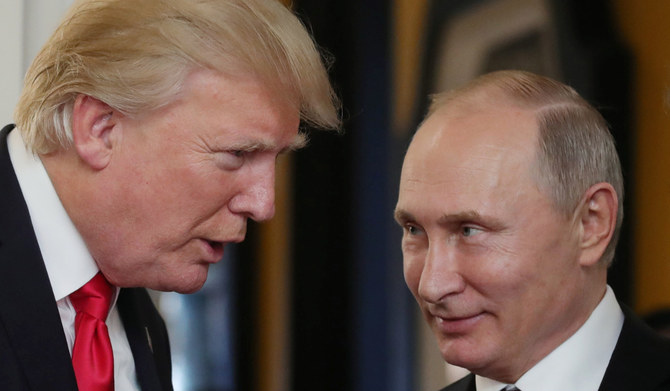WASHINGTON: The US has not seen Russia shift on its preference from previous US presidential elections on who it prefers to win this year, a US intelligence official said on Tuesday, indicating Moscow again favors Republican Donald Trump.
The official, briefing reporters on US election security, did not name the former president and presumptive Republican nominee when asked who Moscow wants as the next US president.
But, he indicated that Russia favored Trump, saying the US intelligence community had not changed its assessments from previous elections.
Those assessments found Moscow tried through influence campaigns to help Trump win in 2016 against Hillary Clinton and in 2020 against President Joe Biden.
“We have not observed a shift in Russia’s preferences for the presidential race from past elections, given the role the US is playing with regard to Ukraine and broader policy toward Russia,” said the official from the Office of the Director of National Intelligence (ODNI).
The Trump campaign did not immediately respond to a request for comment.
Trump frequently has criticized the scale of US military support for Ukraine — some $60 billion since Russia’s full-scale invasion in 2022 — and called Ukrainian President Volodymyr Zelensky “the greatest salesman ever.”
Two of his national security advisers have presented Trump with a plan to end US military aid to Ukraine unless it opened talks with Russia to end the conflict.
On policy toward NATO, Trump has said he would “encourage” Russia to do “whatever the hell they want” to any alliance member that did not spend enough on defense and he would not defend them.
The NATO charter obliges members to come to the defense of those who are attacked.
The ODNI official conducted the briefing on condition of anonymity with ODNI colleagues and officials from the FBI and the National Coordinator for Critical Infrastructure Security and Resilience, an agency that conducts cyber defense for the government and works with private industry.
He defined election influence as efforts to shape the outcome of polls or undermine democratic processes, while interference constitutes efforts to disrupt the ability of the US to hold a free and fair vote.
The US has not monitored plans by any country to “degrade or disrupt” the country’s ability to hold the November elections, he said.
But Russia, he continued, has begun through social media and other means trying to influence specific groups of US voters in battleground states, “promote divisive narratives and denigrate specific politicians” who he did not identify.
“Russia is undertaking a whole of government approach to influence the election, including the presidential, Congress, and public opinion,” he said.
Moscow “determines which candidates they’re willing to support or oppose largely based on their stance toward further US aid to Ukraine and related issues,” said the official. “It’s all the tactics we’ve seen before, primarily through social media efforts” and “using US voices to amplify their narratives.”
Russia recently has been seeking to influence US audiences through “encrypted direct messaging channels,” said the official. He did not elaborate.
China is assessed as currently not planning “to influence the outcome of the presidential race,” the official said.
The US views China as its leading geostrategic rival. Beijing and Washington have been working to ease strains. The Chinese embassy did not immediately respond to a request for comment.
Beijing is trying to expand its ability to collect and monitor data from social media platforms “probably to better understand and eventually manipulate public opinion,” the official said.
The official called generative artificial intelligence a “malign influence accelerant” being increasingly used to “more convincingly tailor” video and other content ahead of the November vote.
















